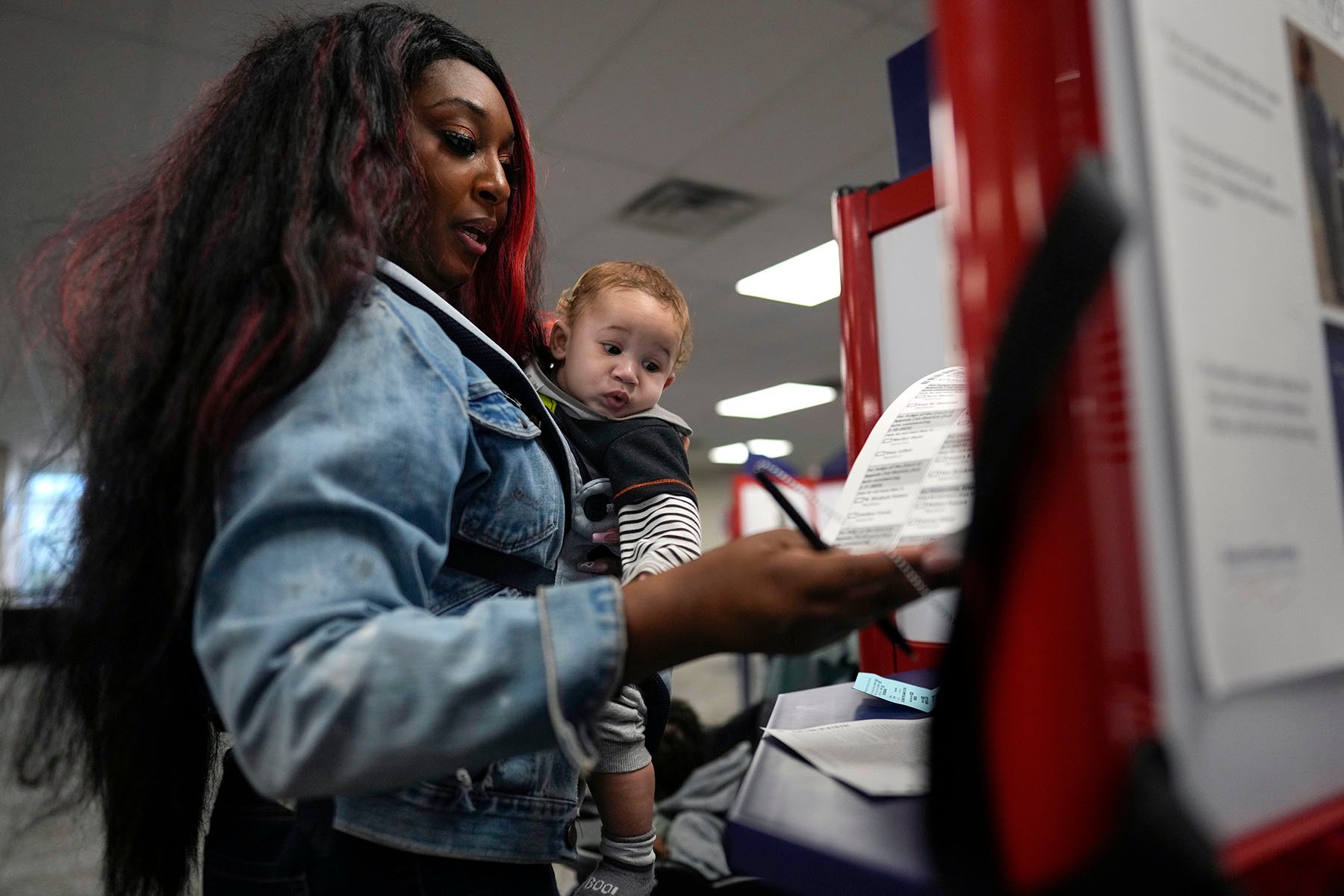Just as she’d done as a little girl with her mom, Elle Arlook walked up to a voting precinct in Washington, D.C., Tuesday morning — but this time with her own daughter, 6-year-old Mariama.
She counted six other moms with their daughters already in line.
Arlook’s mother, Karen Nussbaum, was the head of the Department of Labor’s Women’s Bureau in the Clinton administration and an ardent labor leader who brought little Elle to picket lines and ballot boxes. “I always got my sticker,” said Arlook, who works in diversity, equity and inclusion. Now a mother of two, this was Arlook’s first time taking one of her girls.
As they waited, she explained to Mariama the importance of registering to vote and walked her through the process. Mariama has been asking questions in recent weeks about the candidates, including about former President Donald Trump.
“There’s a lot of people that are having a really hard time, and they tend to vote for people that they think are speaking to them, and he speaks to a lot of people. It’s an important perspective to understand,” Arlook told her in the lead up to Election Day. “Our job is to figure out: How do we get everybody talking together?”
Inside the polling booth Tuesday, Mariama stood with Arlook as she selected Kamala Harris’ name on the screen. Mariama fed the ballot into the machine when they were done.
Like many other parents who are voting with their kids in tow Tuesday, Arlook’s vote was for her kids.
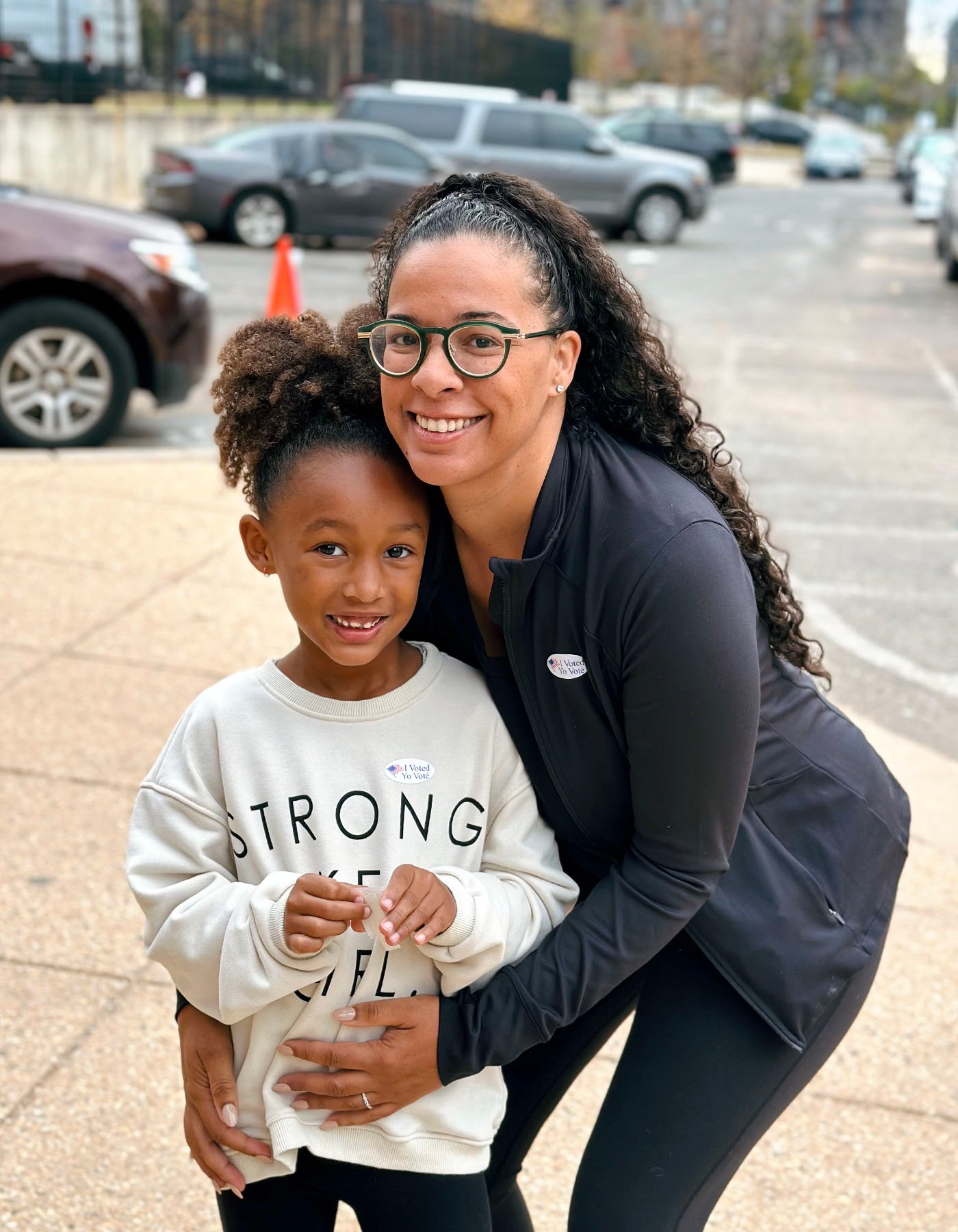
Arlook is supporting Harris because she believes the candidate is pushing “policies that feel like the average person is going to feel the impact of them.” She cited Harris’ proposal to tamp down on corporations that price gouge on grocery items, as well as her support for expanding reproductive rights.
This is the first election where politicians are starting to speak more directly to the needs of caregivers and addressing the high cost of being a parent in the United States. Issues like inflation and its impact on family budgets have taken on added urgency for caregivers in the four years since the last presidential election cycle. And abortion is expected to be a powerful motivator that drives decisions for many women this presidential election, the first since Roe v. Wade was overturned. Abortion access is on the ballot in 10 states this year.
It’s also the first election where a Black woman is at the top of the presidential ticket. Arlook couldn’t help but get choked up when she thought about the symbolism behind her vote.
She told Mariama: ‘This is the first time in my life, or in anybody’s life, we’ve been able to vote for somebody that looks like you and me. Who is Brown like us and has a kind of funny-sounding name like yours,’”
Mariama got her sticker — and one for her little sister — and stuck it to her sweatshirt, which bore the words: “Strong like a girl.”
In Atlanta on Friday, doctoral student Victoria Lindsay and her 9-year-old daughter, Lindsay Marie, got their long-awaited stickers, decorated with a Georgia peach in the middle, at a library on the east side of Atlanta. Lindsay wore her green-and-pink Alpha Kappa Alpha sweatshirt, honoring the sorority that also boasts Harris as a member.
A few weeks ago, her daughter had the opportunity to meet Harris and former President Barack Obama during an event in Dekalb County.
“It’s extremely important that she sees history in the making,” Lindsay said. “Lindsay’s been with me throughout my accomplishments — she was right alongside me as I finished my bachelor’s, my master’s, and now, my Ph.D program.
“It only seems fitting to have her be a part of something so important to all of us.”
It was lucky for Laura Klarich, really, that Election Day lands on a Tuesday — it’s one of the only days in the week that she’s not working part time as a marketing consultant. Mid-morning, with her 18-month-old daughter, Olivia, in a stroller, she waited in an hourlong line to vote at a local church in the suburbs of Columbus, Ohio. She got the idea to vote with her baby from another mom she knows who took her child to vote in a wearable carrier last year. Klarich thought she could also show someone it’s possible to do both: be a parent and be a voter.
Klarich wants people to “see more moms out and about bringing their kids and realize this is allowed — it’s even encouraged — to show the next generation how to participate,” she said. She’s part of Moms First, a nonpartisan organization that advocates at the state and federal level for child care and other family policies.
Klarich recently started working part time in an effort to regain some work-life balance. She was working up to 70 hours a week as a marketing director, a job that was keeping her from Olivia and her 4-year-old, Mya. After she went part time, Klarich had to cut back on day care for her youngest to manage the cost. When she voted for Harris this morning, it was not because she had heard a “great fix-all solution” on child care from the vice president, who has given only a few details on how she’d tackle the larger issue outside of repeatedly expressing support for a federal solution, but because Klarich feels Harris “is trying harder to understand the actual core issues for people like me.”
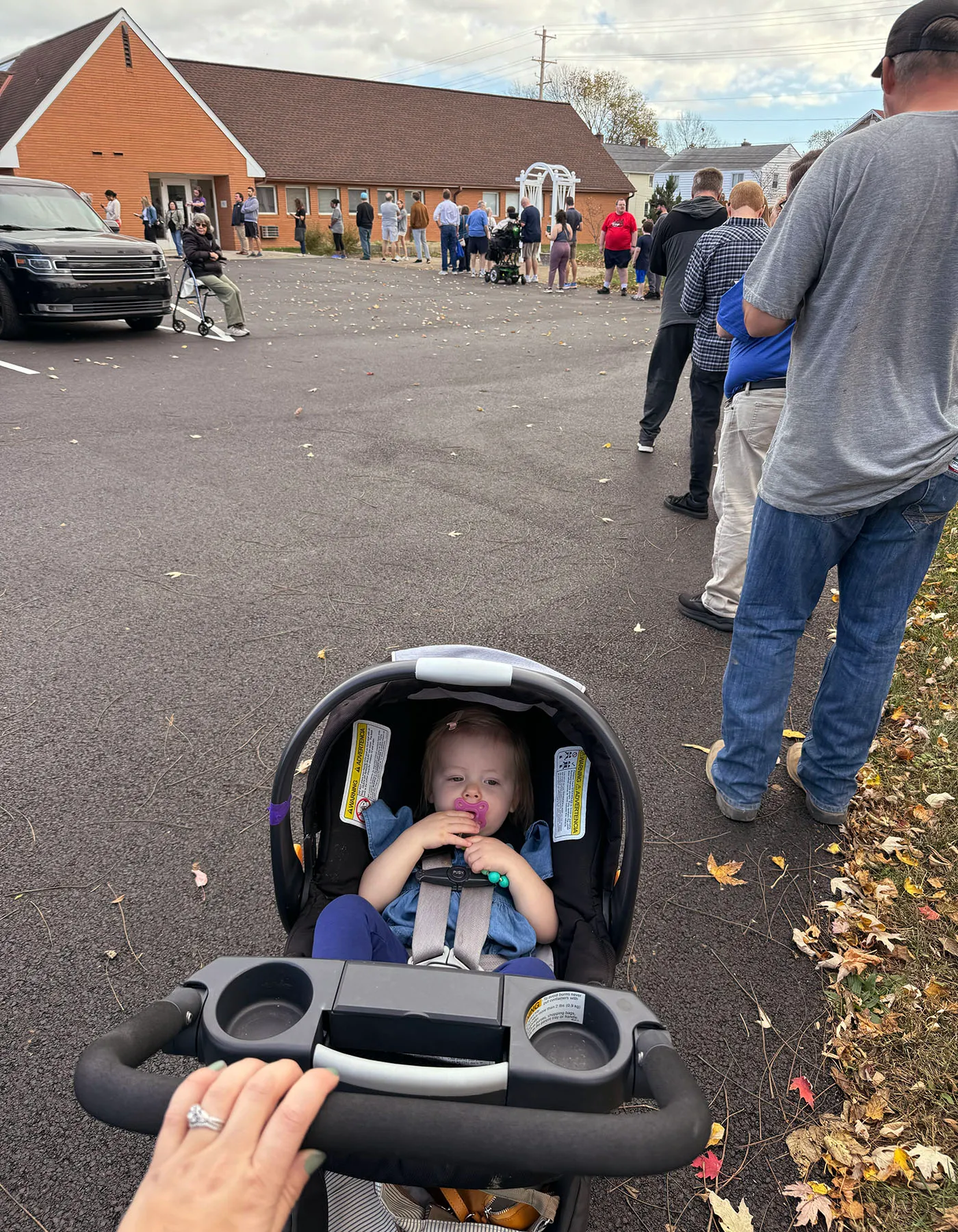
Reaching caregiver voters like Klarich has been a challenge in the past because politicians have routinely struggled to speak to the difficulties of raising children in America — and have rarely felt the need to. As a result, caregivers are one of the largest groups of non-voters in the country. So while some parents who turned out Tuesday did it for personal or symbolic reasons, others did it because they had no choice — schools were closed or they had no child care.
Groups like MomsRising have been part of a nationwide effort to remove some of the barriers to voting for caregivers, including creating “treasure boxes” at polling sites for parents who may be in line with little ones. In the boxes: voting-themed word searches and crossword puzzles, plus toys they get to keep, including stickers, fidget spinners, push poppers, mini skateboards and yo-yos.
The yo-yos have been very popular, said Beth Messersmith, the senior campaign director for MomsRising’s North Carolina chapter who was staffing a treasure box at a polling location in Durham Tuesday. Public schools there were closed, and the parents who had to bring kids along were relieved to find there were activities for them. It also gave parents an opportunity to educate their kids on the process — one mom equated the choice between two toys in the treasure box to the choice between two candidates.
It’s the kind of thing parents across the country were doing in the lead up to Election Day. In Mount Pleasant, Wisconsin, about 30 minutes south of Milwaukee, Dianne Surges voted with her 3-year-old, Amelia, alongside her. The two have been practicing voting using different foods.
“We do these little ballot votes like, Oreos or Goldfish. Or like, chicken nuggets or sausage for whatever she wants to eat for the day. Just practicing so that she is interested,” Surges said. “It’s important for her to know what’s going on. I was never brought up with politics and stuff. I want to bring my kids up knowing they have a right to vote and decide what’s going on in the places that we live.”
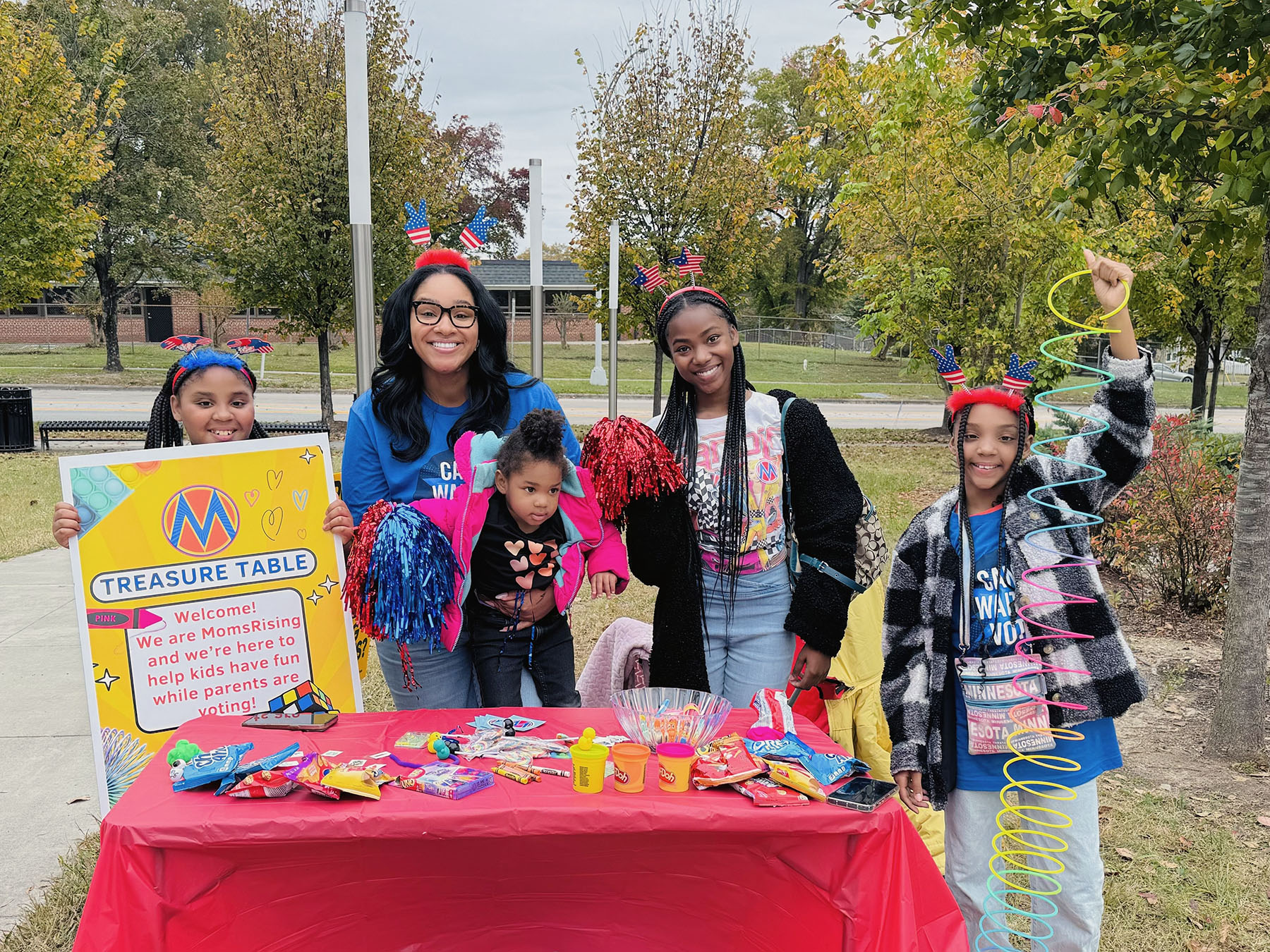
For Messersmith in North Carolina, it was important to offer that help to parents, “who are being superheroes by voting,” she said, so they knew they didn’t have to go at it alone. The coloring pages she handed out had messages like, “My mom is a super hero. She votes!”
The enthusiasm from parents voting this election, at least anecdotally, is higher than she’s ever seen it, said Nancy Glynn, New Hampshire’s campaign director for MomsRising, who is working her third presidential cycle.
Issues like child care and paid leave have never been asked about in presidential debates until this year. That visibility is energizing parents, and especially moms, to hit the polls with their kids, Glynn said.
“Really normalizing that you should bring your kids with you, that you can bring your kids with you, she said. “I feel like that messaging has absolutely started to hit home. It’s starting to become destigmatized. The power of women.”
Witnessing a presidential cycle where candidates have taken the realities of the country’s child care crisis seriously has been remarkable for Deanna Jhaveri, a writer who has spent the past couple of months speaking to moms through the South Bay Area chapter of Chamber of Mothers, a nonpartisan group advocating for moms. Jhaveri started the chapter in July; some moms drive an hour-and-a-half to attend. They talk about child care a lot.
“It makes women feel so unseen. These women are working at Apple and Facebook and Google, literally, and they’re thinking, ‘How can I have another child?’ That’s crazy,” Jhaveri said.
She brought her 3-year-old son along with her to vote Tuesday at a Buddhist temple, a precinct near her home in Palo Alto. Jhaveri feels “very anxious, but also very hopeful because we have seen candidates be asked about child care and paid leave and maternal health in ways they’ve never been asked before, which proves these conversations are working.”
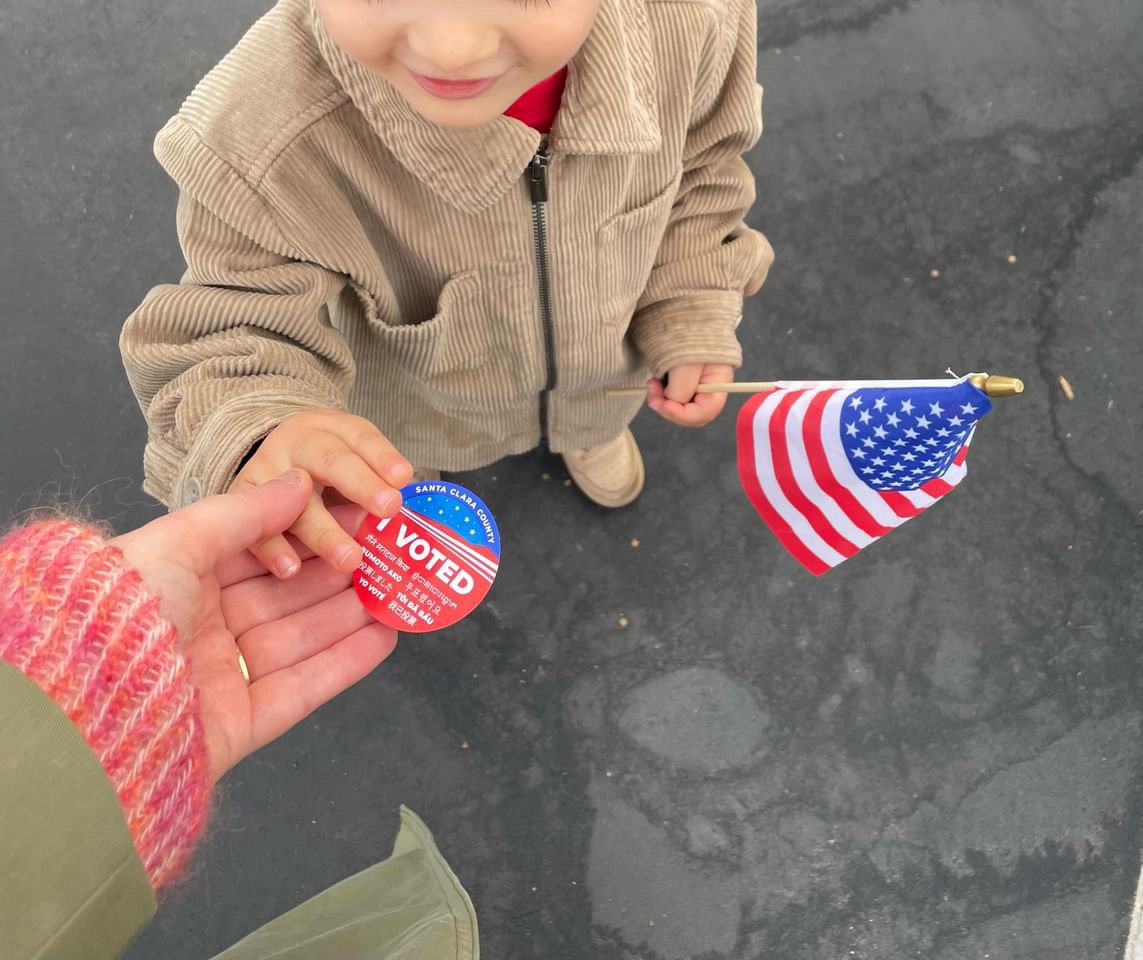
Jhaveri said it also felt important to her to have her son there when she voted for those values, particularly when it comes to reproductive freedom and supporting a candidate who has vowed to expand access to abortion care. Jhaveri voted for Harris.
When her son hit the “cast” button on the ballot machine, the poll workers cheered.
“I want my son to see me in places of power and that includes at the ballot box,” she said. “And I want my son to see me using my vote, not only for him, but for me. I think as mothers we always go to: ‘We are voting for a better future for our children,’ and I think that’s always true. But I’m also voting for a better future for me.”
Camilla Thompson and her 2-year-old, Ava, listened to Beyoncé’s “Brown Skin Girl” on the way to vote in Exeter, New Hampshire: Your skin just like pearls / The best thing in the world / I’d never trade you for anybody else.
Ava wore a pink T-shirt with the words “In my Kamala era” on the back. “We are going to vote for a president and the president looks like you,” Thompson told her before they got there.
In her first election in 2012, Thompson voted for President Barack Obama. “Now to take it a step further and have a Black woman of color possibly become president?” she said. “It just feels like it’s like your ancestors’ wildest dreams.”
Thompson is a medical assistant at a hospital in Exeter, an abortion doula for the Reproductive Freedom Fund of New Hampshire — which helps cover costs for abortions — and a maternal health coordinator for Black Lives Matter New Hampshire.
She also has four kids. The two oldest boys have gone to vote with her in past elections, a value instilled in her by her father, who grew up at the end of segregation and often reminded her: “People died for your right to vote.”
But this year, Thompson took Ava, her only daughter.
Thompson had an abortion when she was 16, something she struggled to process as a person who had been put up for adoption. Her birth mother had first sought an abortion. Thompson knows the decision was right for her — and it’s top of mind for her as a mother.
“If [Ava’s] in my shoes at 16, what kind of abortion access would she have?” she said. “If nothing else matters, women’s rights matter. So it was really powerful for me to bring her.”
The urgency of voting on reproductive rights is what drove Eleanor Grano, who is on parental leave with her first child, to a voting precinct in the suburbs of Chicago on Monday, the last day of early voting there. When he arrived, the newborn dressed as a silver ballot box drew the admiration of just about everyone. Edward is just 8 weeks old, but his mom wouldn’t have let him miss his first election — even if it meant standing in line for an hour and a half. It was a pretty irresistible photo op.
Grano spent two years navigating infertility, enduring five rounds of in vitro fertilization and a miscarriage before she had her little boy. She did it while working as a communications professional for abortion funds in Texas and Illinois.
Over the past several years, Grano has experienced the duality of choice when it comes to reproductive rights in America. Her own choice to become a mother; others’ choice to not. In Texas, so much of that choice was stripped: The state put a ban on abortion after six weeks — before many people realize they are pregnant — in 2021.
Grano doesn’t agree with Harris on everything, but she believes Harris will work to protect reproductive care and Trump would likely further claw it back. On a personal level, that will only make her job harder. Living without the anxiety that another Trump term is all but certain to bring to her work will allow her to be there for her child more, she said.
“It’s going to help me be a better parent,” Grano said.
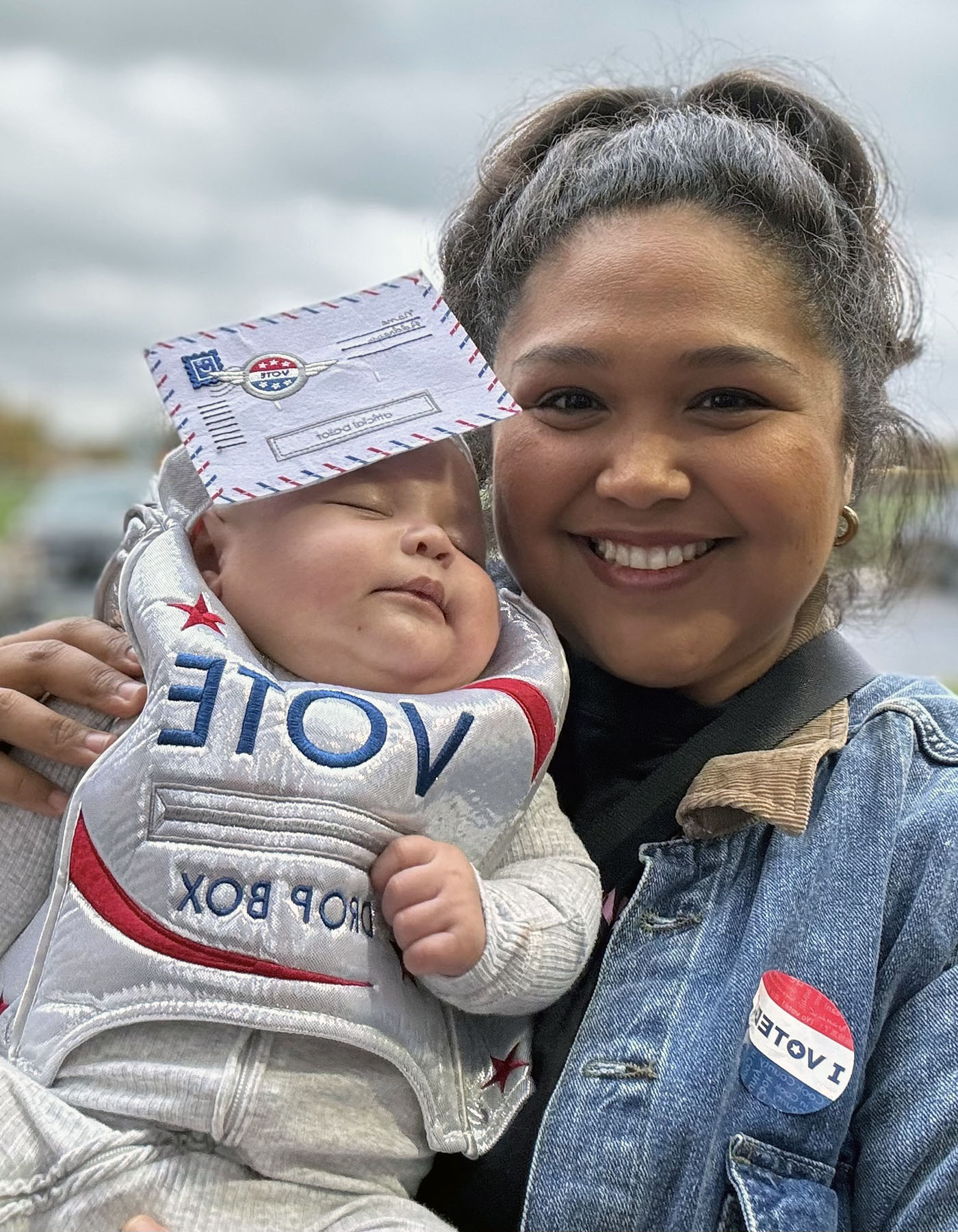
For her, it only made sense, then, to have her son there, the word “vote” embroidered across the front of his costume, as she filled in the bubble next to Harris’ name and in support of a state ballot referendum gauging public interest to even further expand IVF coverage in Illinois.
Maybe one day Edward will come to treasure the photos of him as a little ballot box on Election Day 2024.
“I hope he’ll look back at it and be excited,” she said, “that his parents were so involved in getting out to vote.”
For now, though, Edward mostly slept in his stroller.
Eden Turner, Marissa Nelson and Grace Panetta contributed to this story.
